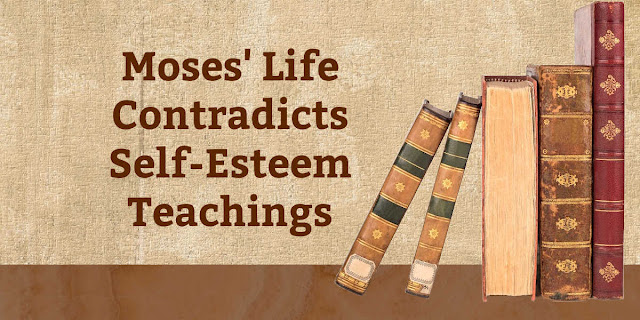How often have you heard someone say Christians will be more likable if we act like Jesus?
The World Doesn't Have a Clue What Jesus Is Like
How often have you heard someone say Christians will be more likable if we act like Jesus?
Biblical Cure for Low and High Self-Esteem
Are you proud of your high self-esteem? Don't be.
Our culture believes high self-esteem is good, but God says neither low nor high self-esteem is desirable. Instead, we need a realistic, balanced view of ourselves, based on our faith—i.e., our esteem for God and our dependence on His wisdom.
“For by the grace given me I say to every one of you: Do not think of yourself more highly than you ought, but rather think of yourself with sober judgment, in accordance with the faith God has distributed to each of you” (Romans 12:3).
The way to achieve this balanced view of self is to quit focusing on self altogether (Luke 9:23-24) and follow the priorities Jesus gave us in Mark 12:30-31:
“‘Love the Lord your God with all your heart and with all your soul and with all your mind and with all your strength’ ... ‘Love your neighbor as yourself.’ There is no commandment greater than these.”
No greater commandment—and no greater cure for high or low self-esteem.
Christianity Isn't about "Formulas"—God's Purposes Will Prevail
Someone recently asked me about a ministry that promises Christians they can have complete victory in every area of their lives (sickness, finances, marriage, infertility, etc.) if they pray specific prayers to break down strongholds.*
Don't Let Others Do Your Thinking for You
Christians are easily misled when we fail to do personal Bible study.
We desperately need God's Word to shape our lives, equip us for ministry, and help us discern errors:
“All Scripture is God-breathed and is useful for teaching, rebuking, correcting and training in righteousness, so that the servant of God may be thoroughly equipped for every good work” (2 Timothy 3:16-17).
Bible teachers and pastors can help us understand biblical truths, but we can't let them do our thinking for us. We must be able to discern between solid Bible teachers and teachers who distort God's Word for their advantage (2 Peter 3:14-17).
So let's do our best to present ourselves to God as discerning Christians who correctly handle God's truth (2 Timothy 2:15).
Scripture Records This Ridiculous Lie
💙 Be sure to check out the Bible Love Notes devotional Wisdom for Life.
It's discounted on Lifeway, Amazon, and CBD.
Is 2 John 1:10–11 about Houseguests?
At first glance, 2 John 1:9–11 appears to be a prohibition against inviting non-Christians into our home. It says this about anyone who doesn't accurately teach the gospel:
"If anyone comes to you and does not bring this teaching [about the gospel], do not take them into your house or welcome them. Anyone who welcomes them shares in their wicked work."
What does this mean?
We were attending the protestant chapel service at a military chapel when a new chaplain was introduced who would be helping to present the service that morning. And he was Mormon (LDS). We quietly slipped out of our seats and went home, feeling that participating in the service would be approving of Mormonism. And we later shared our concerns with the chapel leadership.
Mormons deny the Trinity, the unique deity of Christ, and the divine inspiration of Scripture.
What's Your "Achilles' Heel"?
The term “Achilles' heel” originated in pagan Greek mythology, coming from a strange, fictional story about a mother who dipped her baby into a river that was supposed to protect his life. However, because she held him by the heel, he remained vulnerable in that one spot and was killed at a young age by a poison arrow shot into his heel.
Since the 1800s “Achilles' heel” has been used to describe something seemingly insignificant that gradually destroys a person, business, or nation.
Scripture expresses this truth in a slightly different way:
“Whoever can be trusted with very little can also be trusted with much, and whoever is dishonest with very little will also be dishonest with much” (Luke 16:10).
Satan targets sins that we think are insignificant. He knows they can become our “Achilles' heels” (Ephesians 6:10-18).
So let's ask God to help us identify these sins so we can deal with them aggressively through prayer and God's Word. (See A Practical Way to Deal with Specific Sins.)
And let's memorize Luke 16:10 and 1 Timothy 1:18-19 as part of our defense.
💙💙💙
“Fight the battle well, holding on to faith and a good conscience, which some have rejected and so have suffered shipwreck with regard to the faith” (1 Timothy 1:18-19).
Moses' 5 Excuses and Why He Wasn't a Good Listener
God told Moses to speak to Pharaoh (in Exodus 3 and 4).
Moses replied:
1. Who am I?
2. Who are You?
3. They won't believe me.
4. I'm not a good speaker.
5. I don't want to do it.
God didn't respond to Moses by building up Moses' ego or encouraging him to esteem himself. He didn't talk about Moses at all. He talked about Himself and His ability to do what Moses could not do on his own. Moses needed to esteem God, trust Him, and obey Him.
It didn't matter who Moses was. It mattered who God was.
God explained He wasn't a little "g" god like those of Egypt, but the Great I Am. He promised to prove Himself to the Egyptian leaders and give Moses words to speak.
I imagine when Moses got to his fourth excuse and said, "I'm not a good speaker," God was thinking, “No, you're not a good listener. I've been trying to tell you that it's not about you—it's about Me.”
Most of us can identify with Moses' attitudes. But it's clear that whenever God asks us to do something, all our excuses are irrelevant.
They Speak Visions from Their Own Minds
Some Old Testament Scriptures are especially relevant to the present state of Christianity. For example, the Lord’s warning in Jeremiah 23:16-17:
“Do not listen to what the prophets are prophesying to you; they fill you with false hopes. They speak visions from their own minds, not from the mouth of the LORD. They keep saying to those who despise me, ‘The LORD says: You will have peace.’ And to all who follow the stubbornness of their hearts they say, ‘No harm will come to you.’”
Throughout history there have been true prophets and false “prophets.” Jeremiah was called the “weeping prophet” because he cared deeply about God’s people even though he was constantly persecuted for accurately sharing God’s loving warnings (Jeremiah 20:8-9).
We’ll be popular if we talk about Christ's love without mentioning His attitude toward sin (John 7:6-7). We'll be popular if we never mention LGBTQ lifestyles and abortion and we claim biblical leadership roles were simply part of Paul's chauvinist misunderstandings.
Discernment disappears when Christians defend biblical errors in ministries, mini-series, music, and popular teachings, claiming that as long as they're doing some good, we shouldn't criticize them.
Compromise is taking its deadly toll as more and more Christians make statements such as: “I'm personally opposed to -----------, but I don't think my vote will matter or I don't want to tell other people what they can do.”
Dear Christians, we should be weeping over the false hopes and stubbornness now promoted in Christianity.
✜✜✜
Notes:
Sometimes a good Bible teacher like Alistair Begg will compromise in a particular area. See Is Attendance Approval?
Should we completely quit listening to someone who teaches mostly good, biblical teachings but gets some important things wrong?
Each individual must make that decision, but whenever we know that a teacher, mini-series, song, or book contains errors, we must be willing to carefully examine all teachings coming from that source.
If we are not willing and able to do this, we should stop watching, listening, and reading teachings from those people.
💙💙💙
💙 I encourage you to take the time to review the information in the Bible Love Note Discernment: Use It or Lose It. It offers extra information for digging deeper.
Bible Love Notes
Moses to the Rescue
Moses saw himself as a rescuer (Exodus 2:11-25).
When he was living in the Pharoah's household, he killed an Egyptian while rescuing a Hebrew slave. This made him lose his standing, and he had to flee for his life.
When he escaped to Midian, his first act was to rescue Reuel's daughters (including his future wife Zipporah) from bully shepherds.
But the years that followed changed Moses. He lost his self-confidence.
Please notice that God didn't use the confident young Moses, Pharaoh's adopted grandson, even though Moses was bold and self-assured, having position, power, and influence.
God waited to use the older shepherd Moses.
We typically choose self-confident leaders with high self-esteem. But God chooses leaders who esteem Him and place their confidence in Him. And Moses is an excellent example.
























